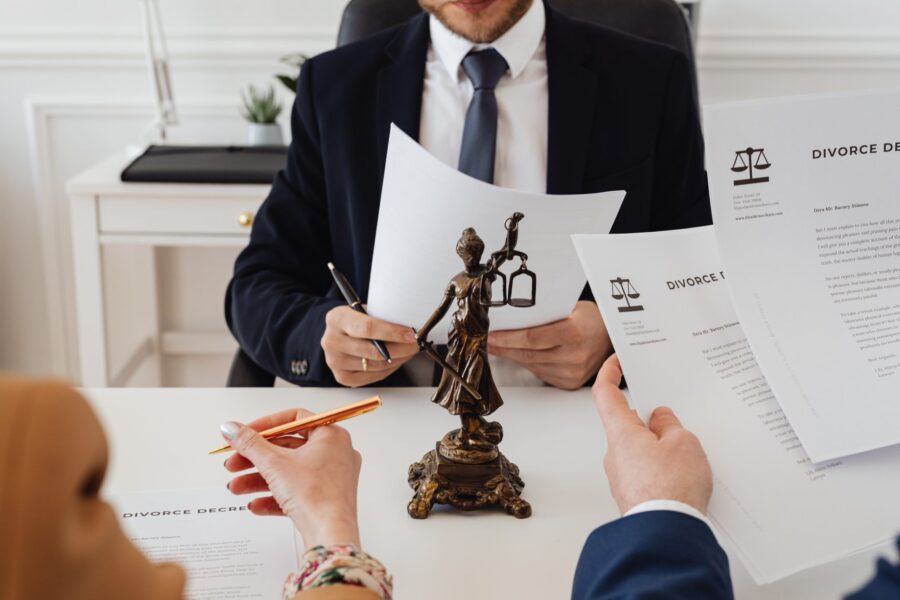Meet Stephen K. Lewellyn
 Stephen K. Lewellyn, a partner with Davies, Barrell, Will, Lewellyn & Edwards, PLC, has been with the firm since graduating from law school.
Stephen K. Lewellyn, a partner with Davies, Barrell, Will, Lewellyn & Edwards, PLC, has been with the firm since graduating from law school.
What types of law do you practice?
My practice is in two areas. The first is business law, which includes establishing and organizing entities, such as corporations, limited liability companies, and other business consulting work, as well as commercial litigation. The second is personal tort work, which includes anything from auto accidents to medical malpractice.
Why did you choose these practice areas?
I chose business law because I have a strong interest in finance and business operations. I began studies in economics, finance, and business management in college and have continued that interest ever since. My background and continuing interests allow me to understand the needs of functioning businesses. I frequently consult with business owners about their company’s growth and development. I am in a unique position as an attorney to help businesses solve their everyday problems, whether involving a lawsuit or setting up a new business.
I chose tort work because I am interested in learning as much as possible about medicine and the delivery of medical services. I know that people injured from motor vehicle accidents or as a result of a doctor who failed to provide proper medical treatment need someone to protect their interest and help them recover from the harm they have suffered due to someone else’s negligence. I have spent decades learning how insurance companies, through their lawyers, try to avoid paying people who are entitled to be fully and fairly compensated when they have suffered at the hands of a careless driver or negligent doctor.
There is a lot of misunderstanding about Personal Injury Law. How does it work?
When someone is injured in an accident due to another party’s negligence, that person can seek to recover the losses due to the injury. This almost always involves a process of collecting compensation from insurance companies which are designed to be extremely difficult. You see, the insurance industry generally makes its money in one of two ways: one, they collect your premiums, and two, they pay as little as possible for claims. The more claims they pay, obviously the less money they make. So, they are highly motivated to pay out as few claims as possible. The insurance industry has spent hundreds of millions of dollars over the years trying to make everyone believe that trial lawyers are bad people when, in fact, it is trial lawyers across the country who have protected people’s right to a jury trial so that your peers determine what is full and fair compensation, not some insurance adjuster who is rewarded for not paying claims. Every year the legislatures in every state of our country are inundated with proposed legislation that would make it more and more difficult for injured victims to get their case in front of a jury. So, without trial lawyers, victims will be victims again by the insurance industry. Insurance companies have professionals, including their own lawyers, who do nothing but figure out how the victim doesn’t get paid. There are a lot of tricks the insurance companies know how to use.
What is an example of a “trick?”
Probably the grossest examples are cases where the insurance company is trying to buy the injury victim off cheaply and quickly. Maybe they’ve offered an injured person $1,000 for a claim that might be worth $10,000 or even much more. Recently, a gentleman came to see me who had settled his claim but had no idea he had settled. The insurance company got to him very quickly after the accident and persuaded him to enter into a settlement. He didn’t realize what was happening, so he signed a piece of paper without understanding that he was settling his claim for a fraction of what he should have received.
How do you know what a victim should receive?
The value of any given claim is a big issue. All claims are not equal. Let’s say you have two different accident victims who have each spent $15,000 on medical expenses. On the surface, it sounds like they are equal, but the devil’s in the details. Let’s say they both suffered pain in their neck and back. The first one goes to the hospital, and the hospital does three MRIs, one of the neck, middle back, and lower back, and maybe even one of the head. That’s easily a $15,000 medical bill. But let’s say there’s no other medical treatment. Compare this with the second person who goes to the hospital with the same complaints and is released without any expensive MRIs or other diagnostic studies. But this second person’s problems continue and they go to the chiropractor, to their family doctor, and ultimately to an orthopedic doctor. The orthopedic doctor orders physical therapy and then they get referred to a neurologist or another type of pain specialist who does injections. This second person has gone through these multiple modalities of medical treatment. So, we have the first person with a visit to the ER with a $15,000 medical bill versus the second person who tried many treatments and is still suffering pain and has that same $15,000 bill. The truth is, the second case is worth much more. The case that is purely diagnostic in medical treatment is not the same as the case where there is treatment for ongoing symptoms.
Evaluating a death case is also complicated. If a person dies at the accident scene there is virtually nothing in medical expenses. But you’ve got a death, so how do you value that? You have to draw on your experience. The valuation is driven by what juries will award and, unless you know that, you can’t properly value a case. We had a client whose spouse was killed in an auto accident. We settled that case for more than two million dollars because we were very aggressive in pursuing the claim. And even though this was a young person with limited education and little demonstrable earning capacity, her prospects looked bright for the future. We were able to establish the case had greater value because of the circumstances.
What do you like most about the law?
Law resolves conflict and thereby brings order to society. A system of fair laws is the bedrock to all great societies. The law integrates our social morals and values. It establishes property rights and allows redress for those who suffer at the hands of a wrongdoer. Without a legal system, we would not have a civilized society, but would still be living in caves.
What advice do you have for someone looking for a lawyer?
Sit down with a lawyer and see if you develop a rapport. A lawyer can be a great lawyer, but if you cannot connect with him or her, then you’re not going to be comfortable even if they’re giving you the best advice in the world and even if they are providing perfect representation. I want my clients to know that I am looking out for them and they have the right lawyer doing the job. If you don’t feel that way about your lawyer, then you need a new lawyer. That level of comfort and trust is critically important to have a successful outcome and comes from that rapport that develops beginning with the first meeting.
Categories:








![Vehicle Crash Shuts Down Route 1 Southbound Near Woodstock Lane [FREDERICKSBURG, VA]](https://www.dbwle.com/wp-content/uploads/2024/08/beh-scaled.jpg)
![Crash Occurs on Madison Rd at Route 29 [FREDERICKSBURG, VA]](https://www.dbwle.com/wp-content/uploads/2024/08/mick.webp)
![Crash Reported on Rt 29 Northbound Near Kelly’s Ford Road [FREDERICKSBURG, VA]](https://www.dbwle.com/wp-content/uploads/2024/08/culpepr.jpeg)

